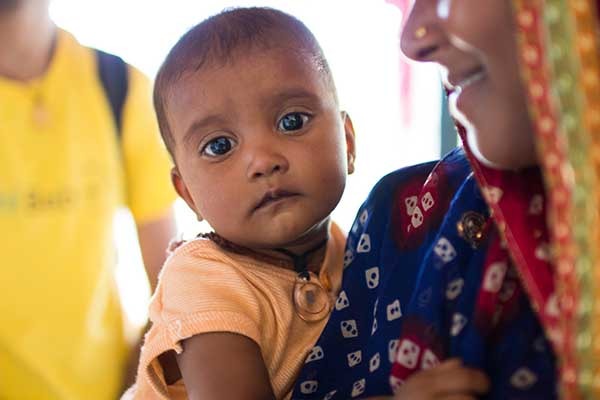
A computer chip necklace which was initially developed as a Yale undergraduate project and has since won several international awards including the UNICEF’s Wearables for Good Challenge. The usage of this is currently in place at several parts of India.
The design of this technology mimics the necklaces that Indian mothers wear on their children in rural India.
The necklace contains a computer chip that is able to store 2 years’ worth of immunisation records of infants and young children.
This device is Near Field Communication (NFC) enabled and can be easily connected to nearby mobile devices.
This way, health care workers seeing patients in remote villages in India can access real-time data. This will help them ensure that children are always updated with their necessary vaccinations through their mobile devices.
These healthcare workers will then return to the city from rural areas and sync from their mobile app to a cloud based dashboard.
This innovation can signal a breakthrough for developing countries facing challenges in infant mortality.
A recent report by United Nations indicates that several developing nations are facing this issue- with India having an average of 41.83 deaths per 1000 live births in 2015.
Many of these deaths were due to infants not receiving vaccinations on time for diseases that they are vulnerable to. Healthcare workers face challenges of having incomplete information on the immunisations they require to transport to immunisation camps in rural areas.
Co-founder of this technology, Ruchit Nagar, is an M.P.H. student in the Department of Epidemiology of Microbial Diseases at Yale. He credited possibility of this innovation to the team’s interactions with mothers and healthcare workers in India.
“Kids are already wearing these types of necklaces for cultural reasons, so it made sense …But we wouldn’t have known that had we not talked to the community’’ said Nagar.
Another challenge of healthcare workers in rural areas is the information communicated to these rural villagers. Many may not be receptive to vaccinations due to the lack of awareness of its long term benefits.
Hence, technological devices like these computer chip necklaces will only be effective with a strong communication strategy in place.
Associate Dean for Development and External Affairs at the School of Public Health in Yale , Martin Klein , is confident that the support given the team working on this project will reap massive societal benefits.
“The financial sector often talks about return on investment, and in dollar terms our $25,000 award has resulted in the team securing over $300,000 in gifts and grants…But the return that matters most is the tens of thousands of children who will be immunized,” he stated.
Image from Khushi Baby Facebook Page
















